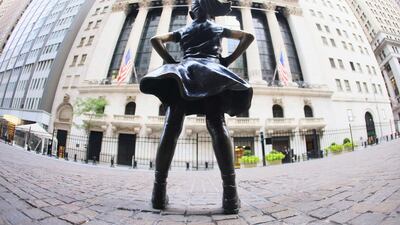US stocks fell and the dollar rose on Friday, even as Treasury yields gained, with traders anxious about inflation and what the Federal Reserve will do to combat it.
With higher rates looming, large technology stocks such as Amazon and Alphabet fell more than 2 per cent.
Major banks such as JPMorgan, Bank of America and Deutsche Bank declined more than 2 per cent, a reversal of the sector's late-summer rebound.
And an earnings miss by heavy equipment maker Deere & Co added to the risk-off mood.
The Dow Jones Industrial Average fell 0.86 per cent to 33,706.15, the S&P 500 lost 1.29 per cent to 4,228.37, and the Nasdaq Composite dropped about 2 per cent to 12,705.22.
European shares fell on Friday and posted a weekly loss as the highest-ever jump in German producer prices in July added to gloom over the economic outlook. The pan-European STOXX 600 ended 0.8 per cent lower.
The MSCI world equity index, which tracks shares in 47 countries, was down 1.3 per cent.
"When market participants start to return from their holidays and look back ... they will find central banks still far from having achieved their goals of reining in inflation," ING rates strategists said in a note to clients.
"That means a continued tussle between central bank tightening expectations and recession fears."
US central bank officials have "a lot of time still" before they need to decide how large an interest rate increase to approve at their September 20 and 21 policy meeting, Richmond Federal Reserve president Thomas Barkin said on Friday.
But more hawkish Fed official comments on Thursday helped push the dollar index up on Friday around 0.5 per cent, a one-month high. The euro was down 0.44 per cent at $1.003.
US Treasury yields also rose on Friday, mimicking European bonds' own sell-off on inflationary fears.
The US benchmark 10-year Treasury yield rose to a month high of 2.9776 per cent, just shy of the 3 per cent threshold it crossed in May for the first time since 2018 as investors worried about the US Federal Reserve's plan to tighten monetary conditions.
Next week, investors will be paying close attention to minutes from the European Central Bank's July meeting, as well as comments by Fed chair Jerome Powell when he addresses the annual global central banking conference in Jackson Hole, Wyoming, on August 26.
"Incoming data, on net, suggests the US economy retains fairly healthy momentum," Michael Gapen, a Bank of America economist, wrote in a client note. He cited improving motor vehicle assembly and retail sales data, but noted declining housing numbers.
"Incoming data was not uniformly strong ... and we note that stronger momentum will ultimately be met with additional policy rate firming," Mr Gapen added.
Oil prices steadied on Friday, but fell for the week on a stronger US dollar and fears that an economic slowdown would weaken crude demand.
US crude fell 0.4 per cent to $90.14 per barrel and Brent was at $96.04, down 0.57 per cent on the day.
Cryptocurrencies fell sharply, with sudden selling dragging Bitcoin to a three-week low. It was last at $21,332, down nearly 9 per cent on the day.
Gold was headed for its first weekly drop in a month after hitting a three-week low. Spot gold fell for a fifth straight session, down about 0.67 per cent at $1,746 per ounce, in what could be its longest losing streak since November 2021.

